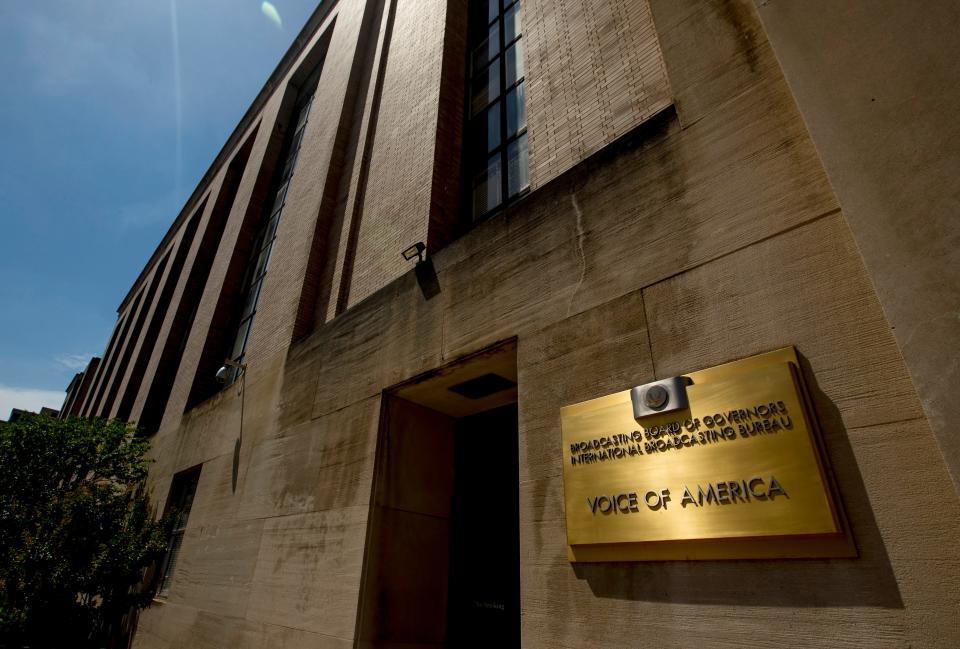The U.S. Agency for Global Media renews effort to extend American soft power
Can a free press promote a pro-American message? That is the key question being addressed at the U.S. Agency for Global Media. USAGM CEO Michael Pack has lately been shaking up the agency, which oversees government global communications organizations such as the Voice of America and various regional networks. Trump critics say Pack’s moves are a threat to press freedom and will make USAGM into an administration propaganda megaphone. Some in Congress think Pack is moving too fast, and responses have ranged from proposals to increase oversight to calling for Pack’s resignation. But President Trump has pledged to veto any efforts to hamper Pack in his reform mission, which has been a long time coming.
USAGM is fundamentally different from most media outlets. Outlets like VOA do not exist just to report news for the sake of news — the vast private sector media handles that — but to serve as a critical “soft power” component of American global strategy.
What public information agencies are for
Public information agencies exist to support and promote American values abroad, while also countering adversary messaging seeking to harm the U.S. image and promote disinformation. This mission focus does not in any way change the necessary rigor with which reporting must be approached, but does affect editorial choices. The country hardly needs publicly-funded news organizations slamming the United States at every turn; reporting like that is already plentiful, from sources foreign and domestic.
The most important aspect of aligning USAGM with the foreign strategy of the United States is to support American policies while avoiding U.S. partisan politics. During the Cold War, this successful approach had bipartisan backing. VOA, Radio Free Europe / Radio Liberty, and other agencies gave people in communist countries news and information denied them by their governments, offering the kind of pro-freedom, pro-human rights narratives that totalitarian governments suppressed.

This did not mean presenting the United States as a model society; famed reporter Edward R. Murrow, who directed USAGM predecessor the U.S. Information Agency during the Kennedy administration, said that “we cannot be effective in telling the American story abroad if we tell it only in superlatives.” Murrow actively promoted USIA reporting on the civil rights issues of his day in the context of American social progress, to counter the communist focus on racism and rioting.
Today there is no need to fret over excessive pro-American reporting. The superlatives Murrow worried about have become so skewed to the negative that simply promoting objective, positive stories about the country is denounced as political propaganda.
COLUMN: Joe Biden Democrats, welcome John Kasich and other Never Trumpers to national convention
The USAGM mission to provide open information to closed societies is as important now as it was during the Cold War. The 1990s optimism that the explosion of information technology would naturally expand the zone of freedom has been dashed by authoritarian regimes using the same technology to create increasingly insidious control mechanisms. Communist China has been a world leader at developing advanced censorship techniques, as well as the freedom-destroying social credit system. The current shakeup at the USAGM-sponsored Open Technology Fund, which seeks to expand access to information inside total states, is primarily a dispute about tactics and oversight, not about the pressing need to develop tools to defeat foreign censorship.
Don't try to restore the BBG
Some members of Congress have responded to Pack’s shakeup by proposing restoring the functions of the Broadcasting Board of Governors, which were removed when USAGM was formed late in the Obama administration. This would be a mistake. The BBG was notoriously dysfunctional. In 2013 then-Secretary of State Hillary Clinton told the House Foreign Affairs Committee that the BBG was “practically defunct in terms of its capacity to be able to tell a message around the world.” Employees at its components long had among the worst morale of any government agency. The BBG was also subject to periodic charges of waste, fraud, and abuse.
Mrs. Clinton also testified that the United States has “the best values” and “the best narrative,” and needed to get back into “the ideological arena.” There is no contradiction between that statement and promoting press freedom. USAGM can and should establish itself as the gold standard for accuracy and integrity in its reporting. USAGM is free of the market-based pressures that have harmed global journalism, and its reporters are required by law to present fair and balanced news.
GOP strategist: Trump's Republican Party is defined by racism and those who tolerate it
By maintaining high journalistic standards and avoiding the hyper-partisanship and sensationalism that increasingly dominates the mainstream media, USAGM could serve as an example of what news can be. This might inspire not only foreign journalists but also the media organizations in the United States that are rapidly losing the public trust. Maybe Pack’s critics can learn from his efforts. After all, USAGM is not the only American media organization in desperate need of reform.
James S. Robbins, a member of USA TODAY's Board of Contributors and author of "This Time We Win: Revisiting the Tet Offensive," has taught at the National Defense University and the Marine Corps University and served as a special assistant in the office of the secretary of Defense in the George W. Bush administration. Follow him on Twitter: @James_Robbins
You can read diverse opinions from our Board of Contributors and other writers on the Opinion front page, on Twitter @usatodayopinion and in our daily Opinion newsletter. To respond to a column, submit a comment to letters@usatoday.com.
This article originally appeared on USA TODAY: Michael Pack's reforms for USAGM: part of American global strategy

